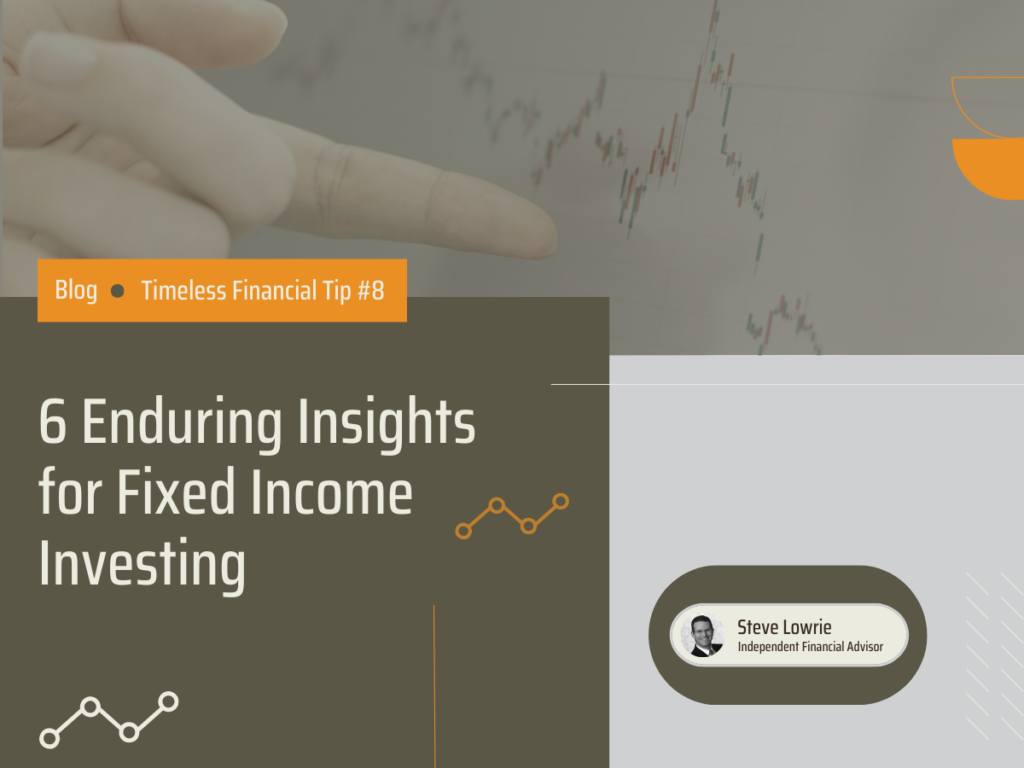Special to Financial Independence Hub
When’s the last time someone tried to talk you into chasing a “hot” Treasury bond run — NOW, before it’s too late!
Probably never, right?
Most of us recognize that’s not what fixed-income investing is for. Bonds create stability; stocks and alternatives are where the excitement is at.
And yet, I often see people forgetting this timeless truth, or at least investing as if they have. Plus, to further complicate things, not all bonds are created equal. This can trick you into thinking you’re playing it safe … just before a big blow-out takes you by surprise.
Following are 6 best practices for fixed-income investing across all kinds of markets, whether rates are rising, falling, or in a holding pattern.
1.) Let your Plans Lead the Way
Our first point is the same “play it again” tip we want you to apply across all your investments — from the safest GIC, to the edgiest emerging markets. Even though we’ve said it before, such as in my past post, The Timely and Timeless Roles of Fixed Income Investing, it bears repeating:
“If there’s one principle that drives all the rest, it’s the importance of having your own detailed investment plan … In the absence of a plan, undisciplined investors instead struggle to predict how, when, and if it’s time to react to unknowable events over which they have little control. While there is no guarantee that your plan will deliver the outcomes for which it’s been designed, we believe that it represents your best interests and your best odds for achieving your personal goals.”
2.) Don’t be Distracted by “This Time, It’s Different”
Instead of letting the shifting tides overtake decades of empirical evidence, repeat after me:
Stocks: Stocks have long been a most effective tool for pursuing new wealth over time and preserving your purchasing power by outpacing inflation. However, along with their higher expected long-term returns, they’ve also delivered a much bumpier ride, which increases the uncertainty that you may not ultimately achieve your particular goals.
Bonds: Bonds have been a good tool for dampening stocks’ volatility, giving you a better chance of remaining on track. They can also contribute modestly to your total returns, but that shouldn’t be their primary role.
The trick is, while stocks have outperformed bonds over the long run, that doesn’t mean they’re always outperforming. There have been times, such as in 2022, when stocks and bonds declined in unison. The markets have gone topsy-turvy, and bonds have outperformed stocks for longer periods of time.
We’ll undoubtedly see times again, along with the inevitable proclamations that we’re (yet again) in a new financial order, and that (once again) the old rules no longer apply.
At least to date, such pronouncements have been wrong every time. That’s likely due at least in part to our next bedrock assumption, which has ultimately crushed them so far.
3.) Benefit from Bond Pricing Basics
One reason bonds tend to be more stable than stocks is their inherently different pricing processes:
Stock Pricing: Stock prices are cobbled together from the market’s collective and ever-shifting guesstimates. Such pricing is relatively efficient over the long run, but often a hot mess in real time.
Bond Pricing: Bond pricing is different. When a bond is issued, or if it is trading in the open market, you know the price you can pay today, the price you will receive when it matures, and the interest payments you’ll receive along the way. Putting all of that together means you can neatly calculate a bond’s return if you hold it to maturity. In bond speak, this is called “yield to maturity” (YTM). Computers can also calculate the YTM for entire pooled bond investments like bond funds or ETFs.
A bond’s YTM won’t change. What will change is how much it’s worth if traded prior to maturity in secondary markets. There, an existing bond’s resale value will rise and fall relative to rising and falling yields in the marketplace.
The future remains uncertain for stocks and bonds alike. But since upcoming returns are already baked into a bond’s yields, the increased — if still imperfect — pricing knowledge translates into a smoother ride, along with a reduced risk premium.
In other words, breaking news may alter prices, but not the pricing process. In addition, bond holders are creditors, whereas stock holders are owners. In the event of a company failure, creditors are more likely than owners to recover their capital.
Understanding these distinctions, it’s easier to accept the timeless role bonds play in your portfolio.
4.) Understand what Central Banks can (and cannot) Do for Us
Perhaps the most frothy bond market news comes from the rivers of rate changes continuously flowing out of the world’s central banks, especially the U.S. Federal Reserve. Each adjustment is accompanied by a rush of coverage on yields, spreads, curves, short- and long-term rates, and so on. It all sounds important. But is it?
Central bank rate changes are useful data points for understanding how global bond markets operate over time. But they should not be a major influence on your immediate investment activities. A recent Dimensional Fund Advisors paper, “Considering Central Bank Influence on Yields,” helps us understand why this is so. Analyzing the relationship between U.S. Federal Reserve policies on short-term interest rates versus wider, long-term bond market rates, the authors found: Continue Reading…







